ARTICLE AD BOX
Jose Mourinho v Pep Guardiola: How Jose became 'The Dark Lord'
Jess Anderson
BBC Sport journalist
When Inter Milan drew Barcelona in the semi-finals of the 2009-10 Champions League, few backed the Italian side to progress against Pep Guardiola's world-beaters.
Both were chasing their own piece of history. Barcelona were trying to become the first team to claim back-to-back titles in the Champions League era while Inter were seeking a first European Cup final since 1972 and a first win in the competition since 1965.
It was a tie tinged with bitterness, with Inter boss Jose Mourinho going up against Guardiola, who had worked together at Barca but were now intense rivals.
It was a tie that defined Mourinho as a coach and ultimately saw him lead Inter to the Treble - the first Italian side to achieve such a feat - as they wrapped up the Serie A title, the Coppa Italia and the Champions League.
And on 28 April 2010, he and Inter took a mighty leap towards that historic achievement.
Fifteen years on from the captivating second leg in Barcelona and with the two preparing to face each other in another Champions League semi-final, BBC Sport takes a look at the story of that fascinating tie.
The Special One v the king of tiki-taka
Tension had been brewing long before the players set foot on the pitch.
In the summer of 2008, Barcelona were looking for a new manager, having sacked 2006 Champions League winner Frank Rijkaard.
The choice was Mourinho or Guardiola, who had worked closely with the Portuguese during the 1990s when he was Sir Bobby Robson's assistant and the Spain midfielder was Barca's captain.
It was a position Mourinho had acquired having first started out as an interpreter for Robson at Sporting, before evolving into an assistant coach. He followed Robson to Porto then Barca.
But while in Catalonia, the Portuguese was disgruntled with his treatment.
He was nicknamed 'the translator' and felt he was not taken seriously.
When it came to Barca appointing a new coach a decade later, Mourinho - who by then boasted Champions League and Premier League titles on his CV - was shunned in favour of Guardiola, who had just finished his first year in management with Barca's reserves.
It was a decision that did not sit well with Mourinho and had a profound impact on the way he would go on to set up his teams, sacrificing pretty football - like Guardiola's tiki-taka - in favour of efficiency a solid defence.
Barca's decision instigated a managerial rivalry between Mourinho and Guardiola that came to a head in 2010 in the tie and was later ramped up while the former was at Real Madrid.
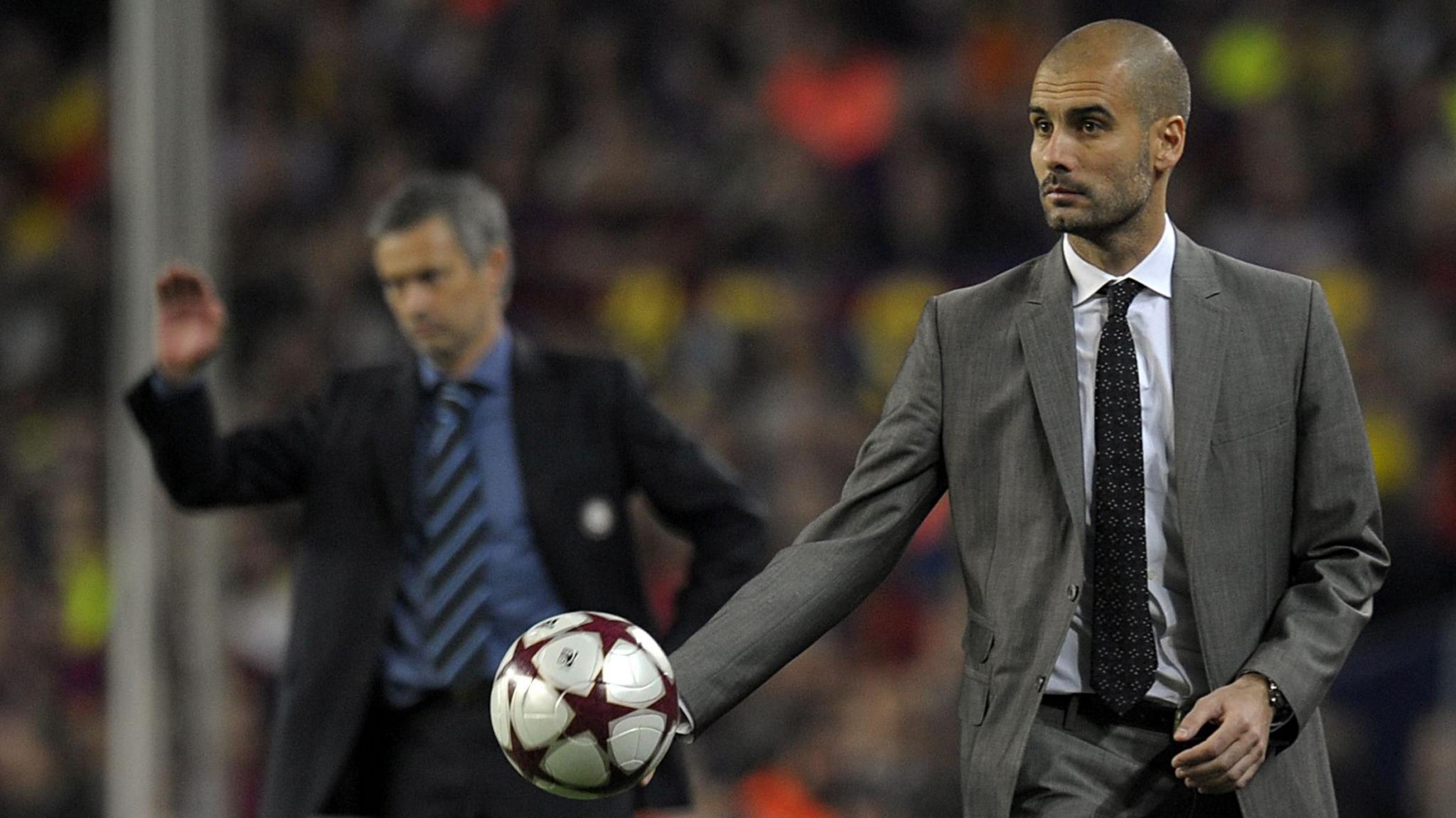 Image source, Getty Images
Image source, Getty Images
Guardiola was appointed Barcelona manager in 2008 in preference to Mourinho
'The Translator' overcomes Guardiola's superstars
Mourinho's 'the translator' nickname returned in mocking tribute in the build-up to the first leg at San Siro.
The feeling was that Mourinho did not stand a chance against a Guardiola team at the height of its power, having won the Treble the previous season.
Already rife with drama and a gripping narrative, the first leg was played under a cloud of ash following the eruption of the Icelandic volcano Eyjafjallajokull.
It meant Barca could not fly to Italy and instead had to take a 10-hour bus journey.
Whether that had any bearing on the match is impossible to know. But it certainly gave an already intriguing tie an air of theatre.
"When you get to the knockouts against a team like Barcelona, you have to win your match at home," said Mourinho in a new BBC Sport documentary - How to Win the Champions League: Jose Mourinho.
That is of course easier said than done with Guardiola's illustrious squad including Lionel Messi, Xavi, Sergio Busquets and Zlatan Ibrahimovic, who Barca had acquired from Inter in a swap deal that season with striker Samuel Eto'o.
"Before the first leg, Mourinho told me 'you're going to play left-back and you will mark Messi'," recalls former Inter defender Javier Zanetti in the documentary.
"I knew Messi from the Argentina team and he was the best player in the world. I followed Messi around and in every zone he went into, two of my team-mates came to pressure him to deny him space to make a difference."
Mourinho's tactics worked and Inter bounced back from an early Pedro goal as Wesley Sneijder levelled before the break then Maicon and Diego Milito assured a 3-1 victory at a rocking San Siro.
"It could have been more. A fantastic performance," said Mourinho.
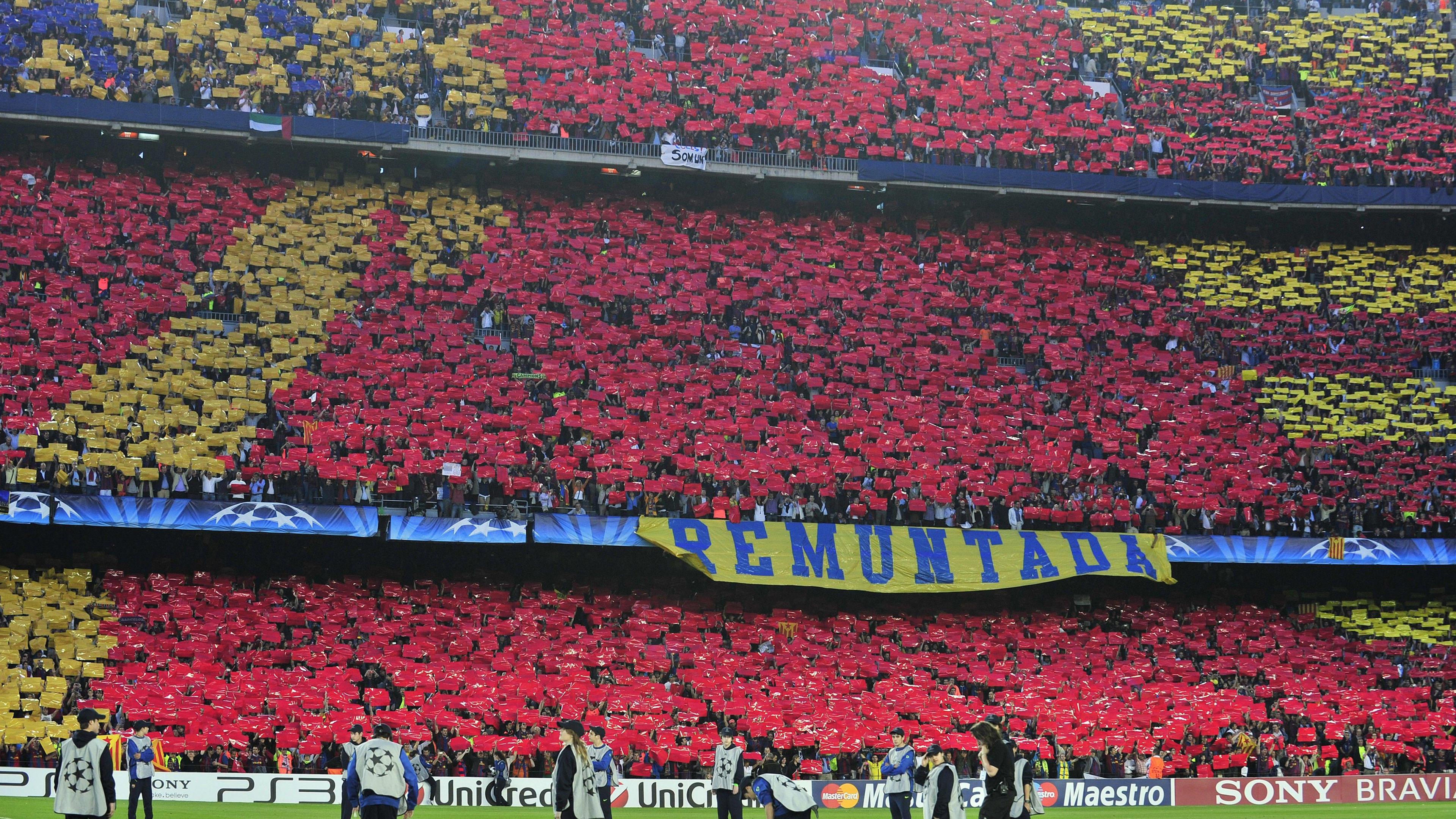 Image source, Getty Images
Image source, Getty Images
Barcelona fans unveiled a banner which read 'comeback' in Catalan at the semi-final second leg at the Nou Camp
'The most beautiful defeat of my career'
So to the second leg.
With a two-goal advantage to protect, Inter needed to produce a defensive masterclass to prevent Guardiola's men, backed by their expectant supporters, overturning the deficit.
The players emerged from the Nou Camp tunnel to be greeted by a banner printed simply with the word 'remuntada' - comeback in Catalan.
"I think that put the pressure on them [Barcelona] because everyone believed they could do it," said Zanetti.
Mourinho's style of play is synonymous with a solid defence, and it was something he relied on that night in Spain. That and a number of top, experienced players.
"At Inter, my bench was full of top players at the end of their careers. [Ivan] Cordoba, [Francesco] Toldo, [Marco] Materazzi, [Dejan] Stankovic. They were not my first choices, but they were my big allies," Mourinho said.
He recalled a speech made before the match by defender Cordoba in the dressing room.
"He was saying 'this is my dream, this is my last opportunity. I am not playing because of him [Mourinho]. He decided to put me on the bench and decided to play you. So you are going to play for me'," Mourinho said.
"When you have this kind of person on the bench and in the dressing room, your work becomes much more easy. I knew that they would do anything for me and I would have done anything for them."
Inter's task became much harder in the 28th minute when midfielder Thiago Motta was sent off for catching Busquets in the face as he raised a hand when defending the ball.
Busquets rolled around on the ground with his hands clutching his face, stopping momentarily to move his hands in a 'peekaboo' gesture to ensure the referee had produced a red card.
The Brazilian's reaction following the dismissal, man-handling Busquets in protest, only fanned the flames of a high-octane encounter.
"We went there with a strategy to try to control, to try and bite in counter-attack," said Mourinho.
"After 20 minutes or so Motta is sent off. People are sometimes afraid to speak about it, I am never afraid to speak about it - the referee's decisions are always crucial."
Down to 10 men and with a 90,000-strong crowd willing their opponents on, Inter sat deep and flooded their defensive areas while the hosts' passing game was typically brilliant but failed to find the gaps.
"During half-time he [Mourinho] was still convinced we would reach the final. His confidence was contagious," said Zanetti.
And, having already dubbed himself The Special One, Mourinho felt confident he had his tactics spot on.
"To play with 10 players against Barcelona, it becomes epic. You need heroes. You need to have the best out of everybody," said Mourinho.
"I think I was brilliant in the way I organised the team. We defended with everything we had. We defended with hearts, with souls. We gave absolutely everything."
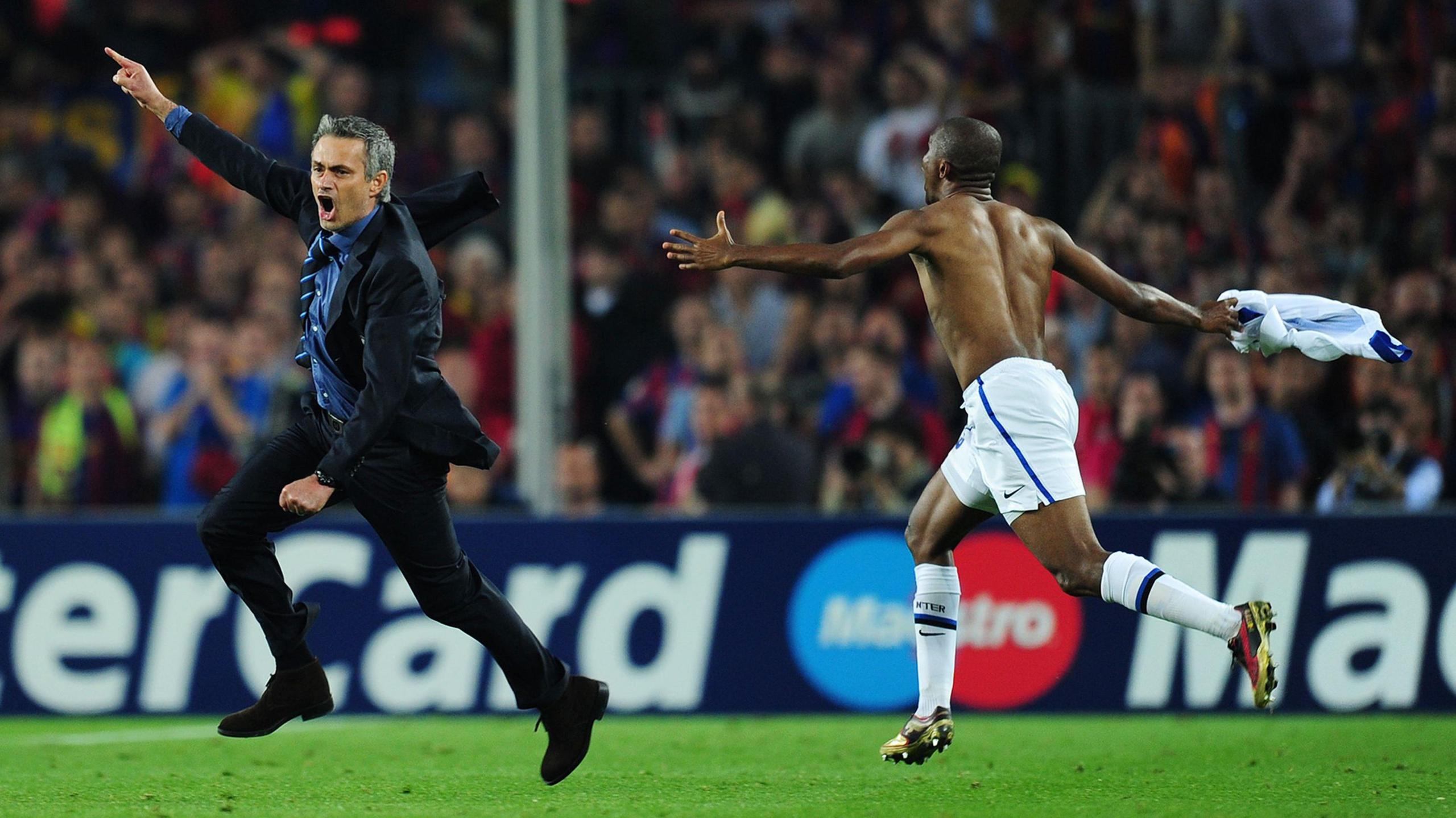 Image source, Getty Images
Image source, Getty Images
Mourinho guided Inter to a first European title in 45 years
High-pressure tactics and gamesmanship continually frustrated Barcelona as almost the entire second half was played in Inter's defensive third. But Guardiola's team of superstars probed without success.
That was until, with six minutes of normal time remaining, Barcelona broke the Italians' backline for virtually the first time as Gerard Pique collected Xavi's pass, turned inside Cordoba's challenge and slid home.
Barca's tails were up and so was the crowd. One more and they would level the tie and progress to the final thanks to their away goal in Milan.
Bojan Krkic thought he had secured victory after he broke free in the Inter box and lashed into the roof of the net in injury time.
But the Nou Camp's joy was short-lived as the referee gave handball against Yaya Toure in the build-up and the match finished 1-0, with Inter progressing to the final to face Bayern Munich.
The full-time whistle had barely sounded before Mourinho sprinted onto the pitch, one arm in the air, to celebrate with his players.
Barcelona chose that moment to put the sprinklers on.
An attempt to annoy the Inter players and stop them from celebrating on the pitch? Perhaps. For Inter, it did not matter.
"It was the most beautiful defeat of my career," said Mourinho.
"The fact that we played with 10 men for so long, makes it absolutely incredible. If I could choose one of my most emotional performances, in a career of more than 20 years, I would choose that one."
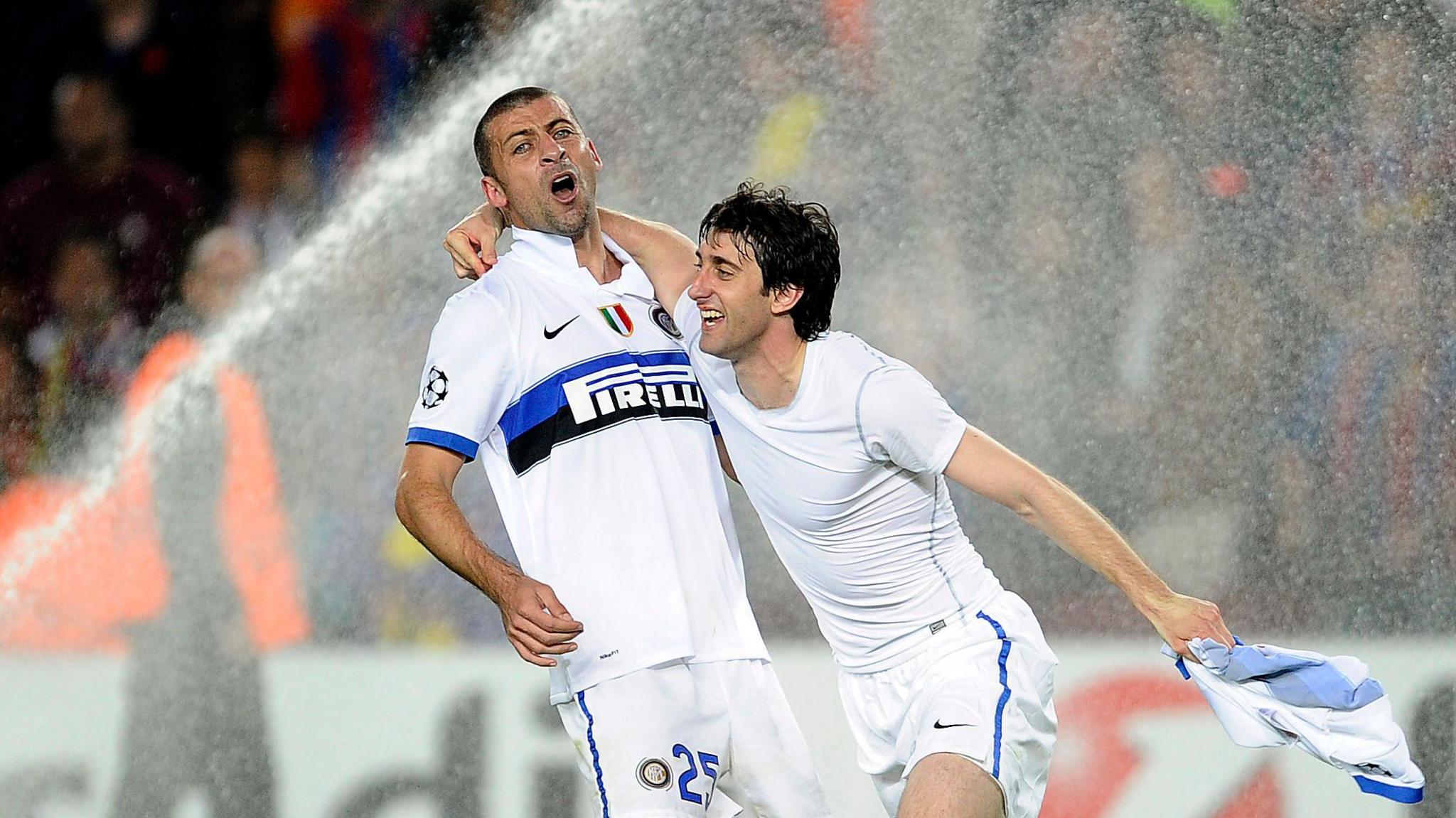 Image source, Getty Images
Image source, Getty Images
Inter continued to celebrate after the sprinklers were turned on at Camp Nou

 2 hours ago
3
2 hours ago
3

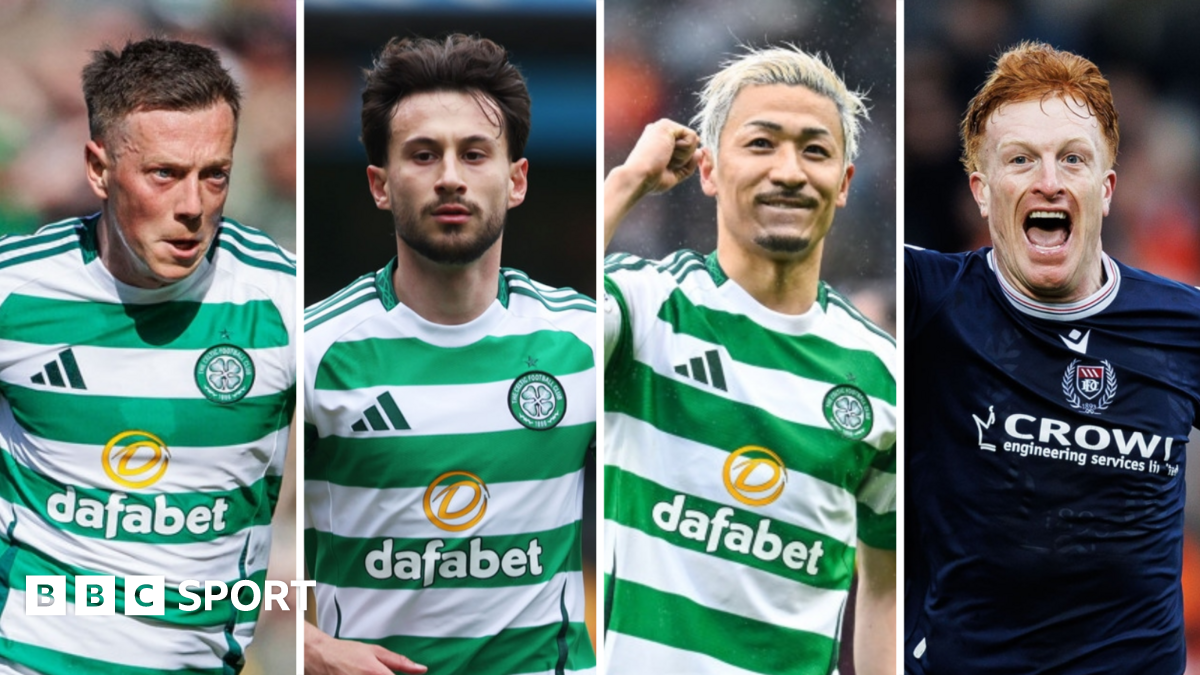
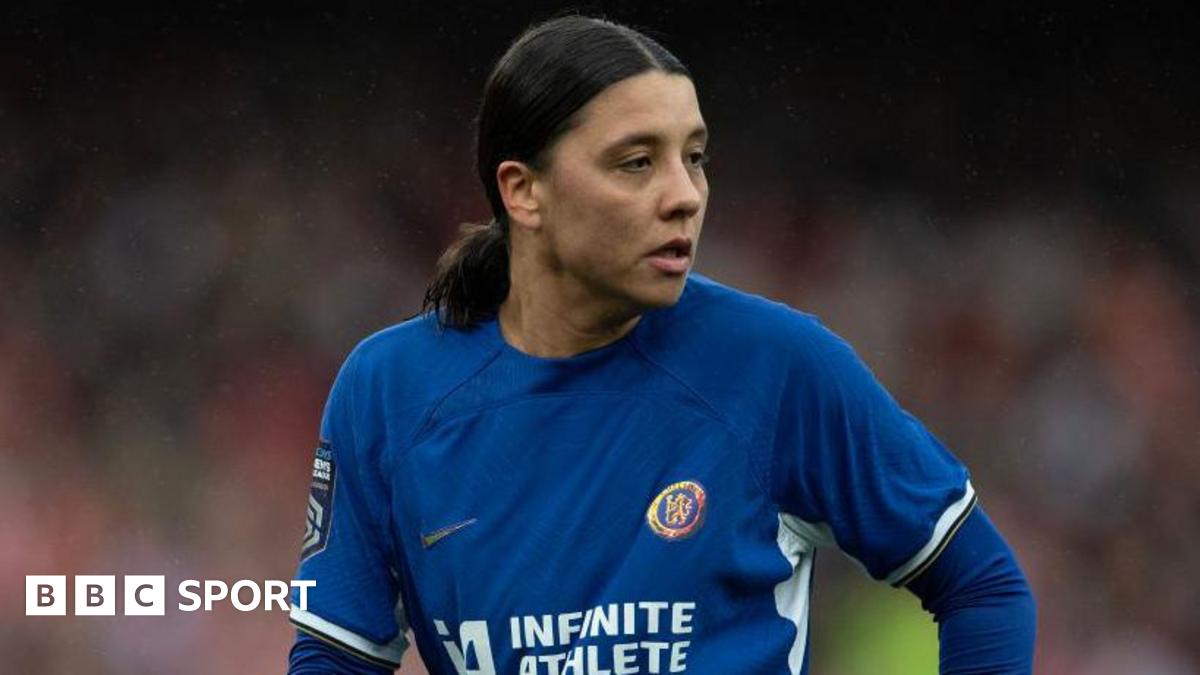





 English (US) ·
English (US) ·